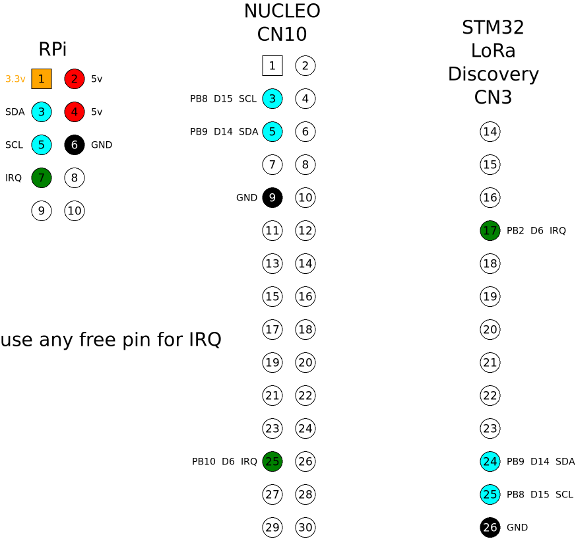i2c slave block transfer driver library
Dependents: i2c_slave_block_example i2c_lora_slave
I2C block read/write slave
operates with I2C master using the i2c_smbus_read_i2c_block_data() and i2c_smbus_write_i2c_block_data() calls.
Tested with raspberry pi as master.
STM32Lx nucleo as slave.
| signal pin | mbed slave | RPi master |
|---|---|---|
| GND | 6 | |
| SCL | D15 | 5 |
| SDA | D14 | 3 |
| IRQ | any avail pin | any avail pin |
IRQ pin is implemented in application, not in this library. (see example)
Up to 32byte length per transfer.
Raspberry pi I2C doesnt support SMBUS block read, so I2C block transfers are supported here.
SMBUS block transfers are variable length.
Instead, here in this driver, I2C block length is mapped to command byte by const array cmd_to_length[] (see example)
master write to slave
For i2c_smbus_write_i2c_block_data() from master, this driver lets the main loop on slave take the write request. The main loop on slave calls service_i2c(), which then calls service_i2c_write() upon each write from master. This occurs thru a circular buffer, permitting the slave to take its time doing the request, while the master can issue several back-to-back requests without delays.
clock stretching
For i2c_smbus_read_i2c_block_data(): Since raspberry pi doesnt support clock stretching out the the box, providing transmit data must be done in the interrupt service routine. fill_tx_buf() populates the transmit buffer to be sent to master, which must be done immediately because this occurs inside interrupt handler.
If I2C master were to support clock stretching, then transmit buffer work could be done in main loop of slave.

An STM32 running at 32MHz is unlikely to operate with 400KHz I2C. Use 100KHz speed with 32MHz CPU, or use faster speed CPU for 400KHz I2C.
smbus.h
- Committer:
- Wayne Roberts
- Date:
- 2019-01-21
- Revision:
- 1:914409dc83b1
- Parent:
- 0:20421a857bd5
- Child:
- 2:ff709de859ed
- Child:
- 3:c012313ebc13
File content as of revision 1:914409dc83b1:
#include <stdint.h>
#include <stdbool.h>
#ifdef __cplusplus
extern "C" {
#endif
typedef enum {
STATE_NONE = 0,
STATE_CMD, // 1
STATE_XFERING, // 2
STATE_SEND_DONE, // 3
} state_e;
int smbus_init(uint8_t slaveAddress);
#define _RX_BUF_SIZE 320
typedef struct {
uint8_t cbuf[_RX_BUF_SIZE];
unsigned cbuf_in, cbuf_out;
//TODO bool c_overrun;
uint8_t tx_buf[32];
uint8_t tx_buf_len;
} i2c_slave_t;
extern i2c_slave_t i2c;
bool cmd_allowed(uint8_t); // return false if slave cannot take this cmd now
void fill_tx_buf(uint8_t);
void service_i2c(void);
void service_i2c_write(uint8_t cmd, uint8_t len, const uint8_t* req); // provided by application
#ifdef __cplusplus
}
#endif